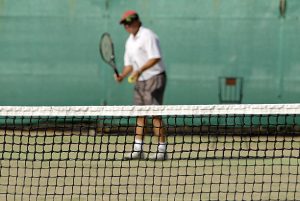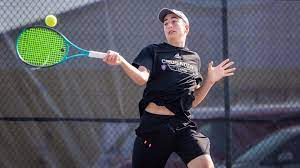How to Play Hockey (Ice Hockey, Field Hockey). Both ice and field hockey are team sports played on ice or grass, respectively. Each game follows slightly different rules, but the basic principle is the same—push a ball or puck into your opponent’s goal. Both games require lots of physical fitness and agility, so even if you have never played before, don’t be afraid to give them a try! The tips below will help you improve your skills and make it easier to earn a spot on your team’s starting lineup this season.
Get good grades in school

Getting good grades in school is important because if you get a low GPA, colleges may not want you to play on their team. If your GPA is below 3.0 in high school, consider playing a sport at a community college or university with no athletic program before trying out for professional teams. Community colleges are typically less competitive and give athletes more playing time, which means it’s easier to get up to speed on skills without sacrificing GPA points. You’ll also be eligible to transfer into one of many Division I schools if your academic performance is solid enough. The most common reason players fail as professionals is because they aren’t talented enough; working hard on academics will keep your options open should things not work out athletically.
Train as much as possible
Just like in any other sport, training is key in hockey. If you want to excel as a player you have to practice as much as possible. No amount of talent can make up for not putting time into your game on a regular basis. If you don’t have access to ice or a field, it’s still possible to train at home by yourself or with friends.
Learn how to fall correctly
It can happen in a split second. One minute, you’re gliding across the ice; next, you’re sprawled on your back, legs in front of you like an X-Wing fighter. And while it might hurt (it usually does), falling is an important part of playing a physical game like ice or field hockey.
Consider playing
The gear, training, and physical exertion required are very similar between ice hockey and field hockey, but most of all they are both great ways to get fit. If you live somewhere that gets a lot of snow then playing ice hockey can be a good way to stay fit during winter months without having to brave icy conditions.
Know your position on the field before you start
Choosing your position can be a lot of fun, but it’s also an important decision because it will affect how you approach play. If you want to score goals, playing as a forward may be your best bet. Do you prefer playing defense? Or would you rather focus on keeping your goalie from having to make too many saves? Are you more interested in supporting your team with solid passing plays? Be sure that your interests are aligned with what’s available when choosing your position. Your own experience level may also come into play. If you’re just starting out, consider trying out as a goalie or forward—positions where strong defense is less crucial than familiarity with scoring plays or good passing ability.
Aim high – always be thinking about playing professional hockey
Practicing is great, but you want to do it with a purpose in mind. What kind of player do you want to become? Thinking about where you want your career to go in a few years can help motivate your practice. Just remember that while most people will never get close enough to play professional ice hockey or field hockey, you shouldn’t be discouraged by their examples. Focus on what’s important–what’s right in front of you. It may seem like an impossible dream now, but if you keep working hard for your goals, it could very well turn into reality someday soon!
Join teams or find places where you can scrimmage
Joining a team or finding places, where you can scrimmage will help you keep your skills sharp and make it easier to stay in shape. You might think that playing on an official team is expensive or difficult, but most cities have recreational leagues available at different levels of competitiveness (and price tags). The easiest way to find these opportunities is by visiting your city’s website or just asking around. You should also check with nearby colleges as they often have sports teams as well. And don’t forget high school! Even if you aren’t planning on joining a varsity team during your teenage years, it never hurts to try out at some point.
Get involved with local clubs and international teams (if allowed by your country’s rules).
The best way to get involved is simply by playing. If you’re good enough, you’ll be approached by professional scouts looking for fresh new talent. Otherwise, you can find a local club or contact your country’s international federation directly with a view to taking part in games. This will give you an idea of what it’s really like to play at an elite level and show off your skills while also giving yourself an opportunity of attracting a sponsor who will pay your expenses as well as offer some free kit (see above). Don’t forget that equipment costs can quickly add up; if there’s no sponsorship available, it might be worth holding off on any purchases until you know what level of competition you’re looking at.





